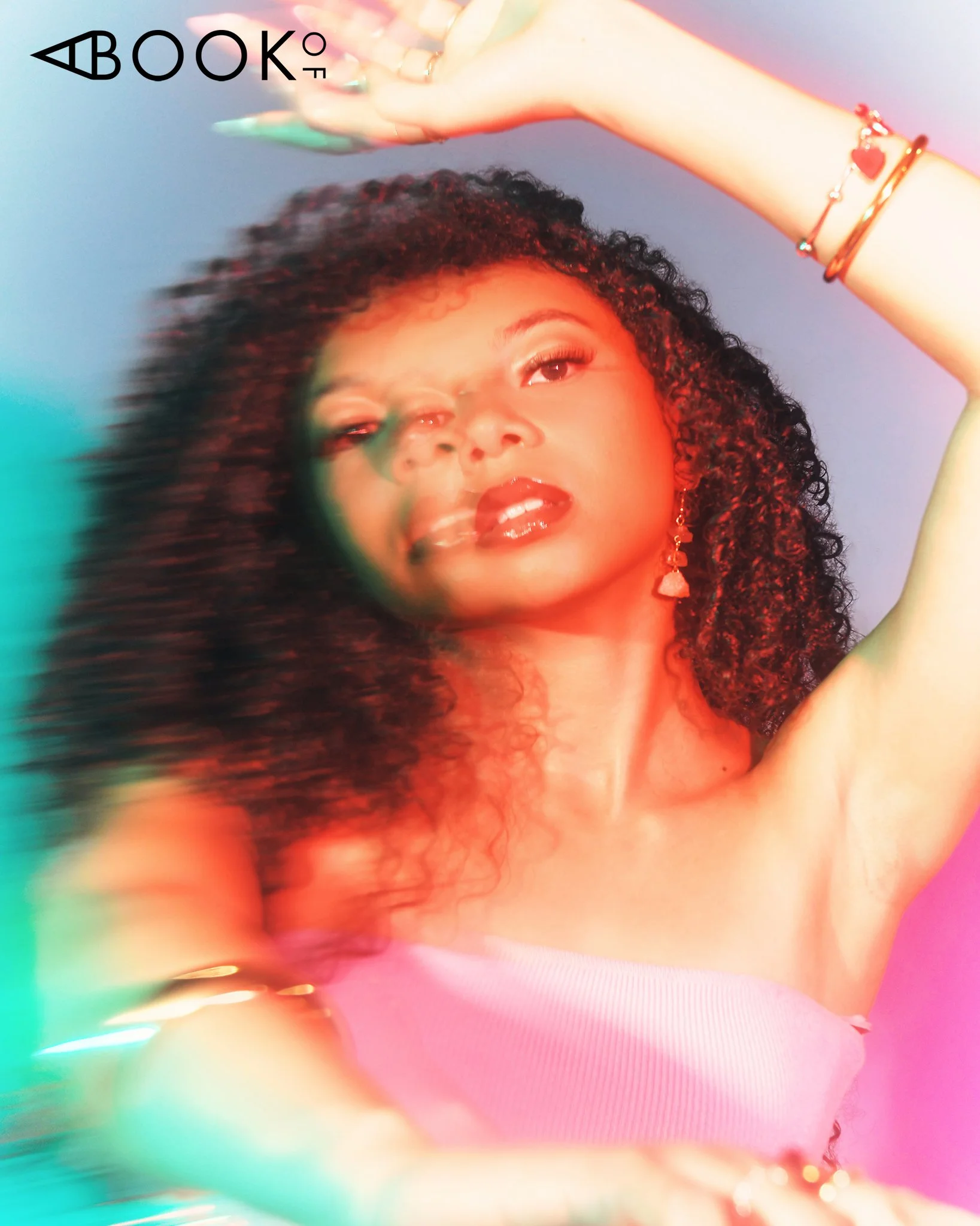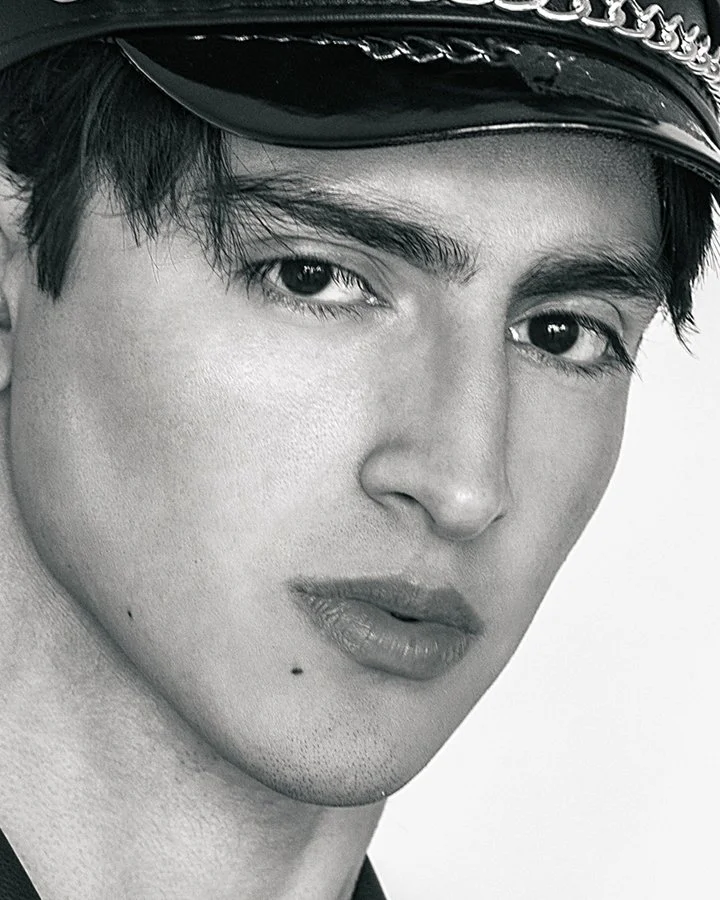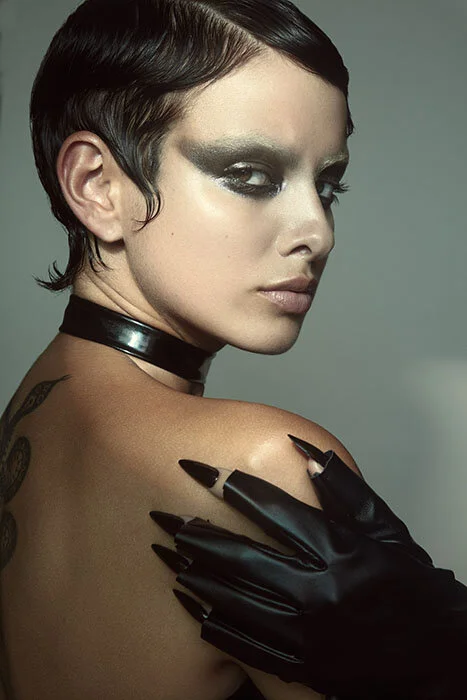MELODY MEETS MAYHEM: SIMONE MILLER IN THE INSTITUTE
BY: IRVIN RIVERA
SIMONE MILLER steps into conversation with the focused calm of a musician—fingers on a piano, a lyric half-written, a shy laugh folded into concentration. In Stephen King’s The Institute—filmed in Halifax, directed by Jack Bender and starring Ben Barnes and Joe Freeman—Miller inhabits Kalisha Benson, a child with dangerous gifts whose quiet steadiness pulls an eerie world back toward human warmth; she brings to that role the same disciplined curiosity that turned childhood commercials into a lifelong craft.
She talks in images: a director’s letter tacked to her wall, a ping-pong break that bled into genuine laughter, and the ritual of humming a song between takes to stay rooted in a character’s inner life. Those small, stubborn practices—writing the unsayable, picking up a guitar on a day off, refusing to dilute a lyric—are how she finds the textures that make Kalisha feel alive rather than simply haunted. Read on for an artist who treats vulnerability like technique and who admits, without fanfare, “I am daring myself and my audience to stare right into my void of ugly, excitement, angst, poignance, beauty, and embrace it all.”
PHOTOGRAPHER: IRVIN RIVERA, DIGITECH: PHIL LIMPRASERTWONG. PHOTO ASST: ANDREW LOPEZ
Hi Simone, how are you? Thank you for your time. What keeps you creative and busy nowadays?
Hello Hello! Thanks so much for having me! Well, through the publicity run for The Institute, I’ve been graced with the opportunity to travel quite frequently, which has kept me busy in the best way! Perhaps even satiated my ever-present wanderlust for the time being. But in the quiet moments, I always find music to be what keeps me creatively inspired. Whether I’m learning a new song on piano, picking up a guitar for the first time in a while, writing, or even listening to a new song that sticks with me. Music has always had its way of keeping me fresh and perpetually inspired.
Growing up in Toronto surrounded by the city’s diverse arts scene and rooted in your family’s support, how did your early years booking commercials and game show appearances at age ten shape your understanding of performing for both camera and live audiences?
Initially, my mom put me into acting in hopes that it would help bring me out of my shell. Ironically, I am actually quite introverted and anxious when navigating big crowds or meeting new people. So, as a means to remedy my withdrawn demeanor, I started with an agency when I was ten and was quickly taken aback by my immediate passion for the art. As long as I could take direction and learn to quickly change my approach to any given scene, I could do no wrong. I could lean into weird or ‘embarrassing’ choices, I could be loud or arbitrary, I could have so much fun that I forgot to be afraid. Adopting this mentality changed everything for me. Though, of course, I am still naturally shy, I have come to love the adrenaline rush that comes with performing, whether that be on screen or on stage.
From that first spark to honing your skills as a singer/songwriter, you built a dual career in music and acting. How have your experiences writing and performing your songs informed the emotional depth you bring to your screen roles?
Writing music is a stream of consciousness that demands complete honesty from its maker. I find that when processing anything, writing about it is the quickest and most effective way to gauge how I really feel. Which, in retrospect, is terrifying. A lot of the time, I have no idea how upset or angry or excited I am until I’ve stepped back and reread my lyrics. Confronting these deep-rooted emotions has given me access to so many facets of feeling to pull from when I’m acting. A lot of the time, I’m faced with characters put through unimaginable fates, so finding those emotional similarities is really grounding and sometimes essential to humanizing a character that could otherwise feel unrelatable.
After countless auditions, you landed the lead in the digital CBC Kids series Raign and later secured roles in Run the Burbs and Detention Adventure—how did stepping into these varied characters teach you resilience and adaptability before joining a high-profile Stephen King adaptation?
Both shows taught me so much and really shaped me as an actor. I think my biggest takeaway from each show was really learning to trust my choices and instincts. When I had initially booked Detention Adventure, I was 12 years old and riddled with trepidation. I was just so grateful for the opportunity and didn’t want to let anyone down, so I was constantly apologizing. Actually, when we wrapped our first season, our incredible director Joe Kicak wrote me a little letter that, in a nutshell, said that he trusted me with this role for a reason and that I had nothing to apologize for. Getting that from someone that I really looked up to meant the world. I still have that letter; in fact, it’s hanging on my wall, reminding me to always carry myself with confidence.
Transitioning to the supernatural horror of The Institute as Kalisha Benson required you to tap into new emotional registers. What drew you to Kalisha’s journey, and how did you prepare to inhabit a world where children possess dangerous gifts?
This Institute is my first thriller! For so long, I was hungry for a project and character like this one. Not to say I haven’t loved every minute working in the comedy/kid series space. I just felt I was ready to take on something with more depth. So when I initially got the audition for Kalisha, I was immediately hooked! I loved how strong and forthcoming she is, all while still being witty and incredibly loving. Of course, the idea of getting to have powers was also enticing, but I ultimately loved that the book and show underscore the kids' humility and strength as opposed to just their powers. This was also the first book adaptation I’d done, so I felt incredibly spoiled in having so much material to adhere to. In preparation, I really just let the book guide me to Kalisha and tried to ground myself in her core attributes. Powers aside, Kalisha and I are actually fairly similar, so slipping into character felt very natural.
Filmed on location in Halifax with Ben Barnes, Joe Freeman, and an ensemble of genre veterans, the show blends Stephen King’s dark vision with cinematic scope. What lessons did you learn from collaborating with those seasoned costars and directors like Jack Bender?
It can be quite daunting to jump into a project with such illustrious names attached to it, but as soon as I met everyone, all of that nervousness melted away. I learned so much from this cast and team of creatives, but one thing that sticks out is that I learned not to take myself too seriously. It can be all too easy to get swept up in the fast-paced environment on set and the intensity of the scenes we are filming. And while sometimes it's important to feel a bit of that gravity in order to channel it into your character, it's just as important not to get crushed under the weight of it all. There was actually a moment in episode two where Joe, Fionn, and I were playing ping pong in a scene, and for whatever reason, we all caught the giggles. The more we tried to keep it together, the more we hilariously failed. We all rushed to apologize to Jack and were met with nothing but smiles. To our surprise, he said that he was actually happy to see us cracking up with one another. He said that moments like this are part of the beauty of performing and bring a level of authenticity and warmth to a scene that couldn't be caught otherwise. In the end, some of our genuine laughs made it into the final cut of the scene.
Kalisha’s story arc intersects with themes of isolation and inner strength—how did you balance portraying her vulnerability with the fierce determination needed to survive the Institute’s secrets?
I always tried to keep her youthful energy top of mind. Amazingly, despite the brutal exploitation faced in The Institute, she can foster such an intangible light in a place so devoid of it. But she is first and foremost still a kid trying to cope and support her friends in the best way she knows how. Representing her strength doesn’t mean removing her fear; it's showing she stands up and dares to hold on to hope anyway.
Working on a horror series inevitably brings intense, long days and late nights. What self-care rituals, whether in music, mindfulness, or movement, helped you stay grounded between takes?
Actually, Ben taught me a little trick that he does to stay grounded in between takes. He said for each role, he’ll pick a song he feels resonates with the character and just sing it to himself between takes. This became a ritual for me as well. I almost always am mindlessly humming or singing something anyway, but to be intentional with my song choice proved to keep me in my character's state of mind, especially on our longer days.
Your Instagram hints at a passionate connection to community and creativity. How do you envision your platform as a means to support emerging artists, particularly those from underrepresented backgrounds in Canada’s film and music industries?
Unfortunately, Canadian-centric media in film and music have a pretty low ceiling for success. Canada has so many hidden gems within these industries, and if/when I’m in the position to amplify their light, I would love to use my platform to do so.
Balancing your dual identity as a singer, songwriter, and actress is like walking two paths at once. How do you decide which creative call to answer next, and what unites these two facets of your artistry?
I actually find that for me, the two carriers have worked together in my favour quite well. Even while filming The Institute on my days off, I had so much time to write and start planning for future endeavors in music. After we wrapped, I had the perfect window to begin producing and further building a vision for a possible wink wink exciting new release later on this year. Now, through the publicity run of The Institute, I have little pockets of time between press opportunities to dedicate to putting the final touches on this upcoming project. I’m fortunate to say that balancing the two has come quite naturally; I never feel like either career competes with the other. If anything, they support one another.
Looking back on the moment you first realized acting could be more than a hobby, what inner conviction pushed you to embrace the uncertainties of a performing career?
I loved sharing space with like-minded creatives where we were encouraged to essentially play and discover new avenues of ourselves through different characters. Especially as a shy kid who didn’t know how to express herself, acting was essential to my growth. It was no longer just something that I enjoyed doing, but something I needed, not just as a creative but as a person. Luckily, growing up with the most amazing mother that I did, she never let me hesitate in following my dreams. There was even a point in my senior year of high school where I contemplated going to university for business instead of pursuing my career in the arts. She said, “You are either going to university for music and film or you aren’t going at all!” My mom has always been such an unwavering light in my life. Through every ebb and flow in this industry, she is such a grounding pillar of support.
As you reflect on the Institute’s early episodes and the reception you’ve seen so far, what surprises you most about audience reactions to Kalisha, and how has feedback influenced your view of the character?
I’m just so glad and excited to see that so many people are enjoying the show! The cast has a little group chat going, and each week it's been so fun to go through and share everyone's posts and responses to the show with them. If anything, it’s just made me that much prouder to have been a part of such an amazing production.
Beyond The Institute, which stories, whether on stage, on screen, or in song, are you longing to tell next, and how do you hope they will challenge both you and your audience?
In the past, my lyrics have felt fairly surface-level and unwilling to reveal the whole story, so to speak. I was fourteen when I released my first single and was still figuring out who I was as a person, much less an artist. I’ve always felt that when I write, I can’t help but capitulate to my own vulnerability, and it terrified me. I would often rewrite and water down my lyrics as a means to protect the people and stories behind them. I am still just as petrified, but I’ve come to realize that’s exactly why I need to release more music that is completely authentic to me. I am daring myself and my audience to stare right into my void of ugly, excitement, angst, poignance, beauty, and embrace it all. I hope this inspires people to look inward and make amends with every avenue of themselves, as I strive to do the same.
In moments when the spotlight fades, what personal passions—gardening, writing lyrics, or something else entirely—reignite your creative spark and remind you why you chose this path?
I would actually say going to the gym. Being a performer requires a heightened connection to your emotions in order to pull from them. I find it really therapeutic to also feel that connection to my body. It’s also something that I feel is just for me. In a sense, you give so much of yourself
when performing. It’s giving people access to your vulnerability, which can be daunting at times. Having an activity that is just mine gives me a break from performing and allows me to decompress. I always feel so fresh and ready to dive into my creativity after a good workout!
Lastly, if you were a book, what book would you be and why?
I would say “Now What!?”. I exist on a very high and low swinging pendulum. There is ALWAYS something crazy going on in my life, and honestly, I wouldn’t have it any other way.


















